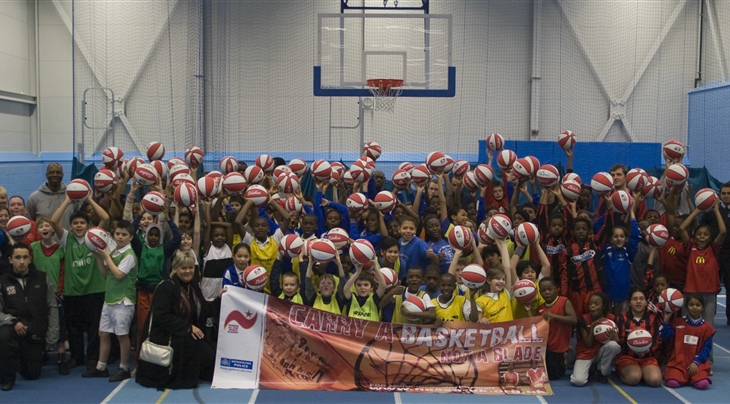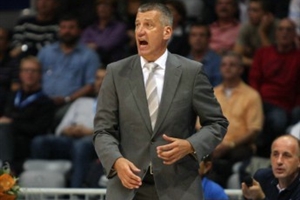
GBR - Basketball a driving force in fight against UK knife crime
LONDON (Off the Court) - A British teenager has launched a pioneering crime-fighting initiative on the doorstep of the London Olympic Stadium to cut knife crime using the power of basketball.
Anthony Okereafor, 19, set up the “Carry A Basketball Not A Blade” campaign after two of his friends were stabbed to death.
The project is aimed at encouraging young people to say “No” to knife crime and the gang lifestyle that accompanies it and take up basketball instead.
It encourages youngsters from the age of eight upwards to play competitively while learning from the Metropolitan Police about the grim statistics and consequences of knife crime in London. There is even a chance to play against a team of officers.
Okereafor said: “It’s all about breaking down divisions between youngsters from different postcodes and between youngsters and the police.
“We are trying to use the popularity of basketball to give them something to do after school and keep them off the streets.
“However, it is not just about stopping people carrying knives. It is also about trying to save lives. I used to carry a knife and have had friends who were stabbed. I live because of basketball.
“There are too many young people dying just because they happen to walk into the ‘wrong’ area.
“If we can get those who might slip into gangs or are already in them to do something positive and constructive like basketball instead that would be a great result."
The grassroots community initiative is being driven by the Newham All Star Sports Academy (NASSA) which is based in the 2012 Olympic borough and runs its own national league teams.
NASSA has grown from 37 members in 2006 to 425 in 2011. It reaches out to 1,700 youngsters with 25 coaches holding training sessions at 66 schools every week and has secured the support of Okereafor’s local MP, Stephen Timms, the Mayor of London, Boris Johnson, as well as Sport England and England Basketball.
FIBA Secretary General and International Olympic Committee (IOC) member Patrick Baumann praised Okereafor and NASSA for their efforts to positively impact and affect their community.
“This initiative is truly inspirational and shows clearly the social power that basketball has to encourage respect, channel rivalry and build communities," he said.
Engage young people
NASSA director Natasha Hart went on to say that “Carry A Basketball Not A Blade” would be beneficial to the participants in more than one way.
“The aim of the project is to engage young people, allowing them to participate in a sport that encourages them to develop both physically and socially," said .
“Basketball offers the opportunity to develop key life skills and creates a strong team ethos as well as educating about health and nutrition.
"But most importantly, it removes young people from the streets and away from the persuasion of becoming involved in knife crime. ‘Carry A Basketball Not A Blade’ is about giving young people opportunities, creating role models and developing their self-belief.”
The players involved in the project attend workshops that look at various topics, such as the consequences of being involved in knife crime, how to deal with peer pressure and the importance of taking responsibility for your actions.
Showcase skills
Following the workshops they then get to showcase their skills on the basketball court which gives them the opportunity to build strong relationships with the other players.
The future vision for ‘Carry A Basketball Not A Blade’ is to encourage participation across the five Olympic boroughs, uniting the young people of East London and raising awareness of knife and gun crime through 2011 and into 2012.
Beyond that, the aim is to roll out the project across the whole of the capital and in other inner cities within the UK.
However, because of funding cuts there is now a question mark hanging over the scheme’s future.
“It would be a terrible shame if all the good work of Anthony, Natasha and the police falls by the wayside because of cutbacks,” cautioned Baumann.
About 11,000 knives have been found and 5,000 people arrested for knife-related crimes since the Metropolitan Police began specifically targeting such weapons in May 2008.
FIBA
















